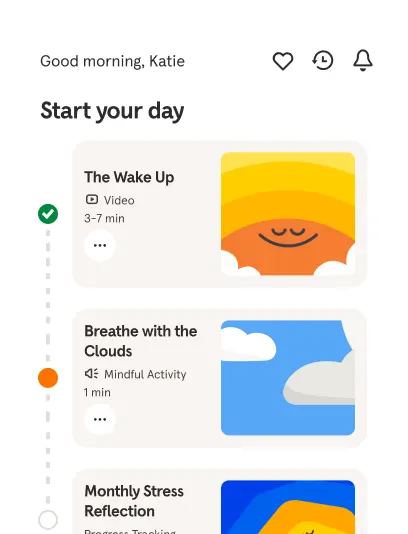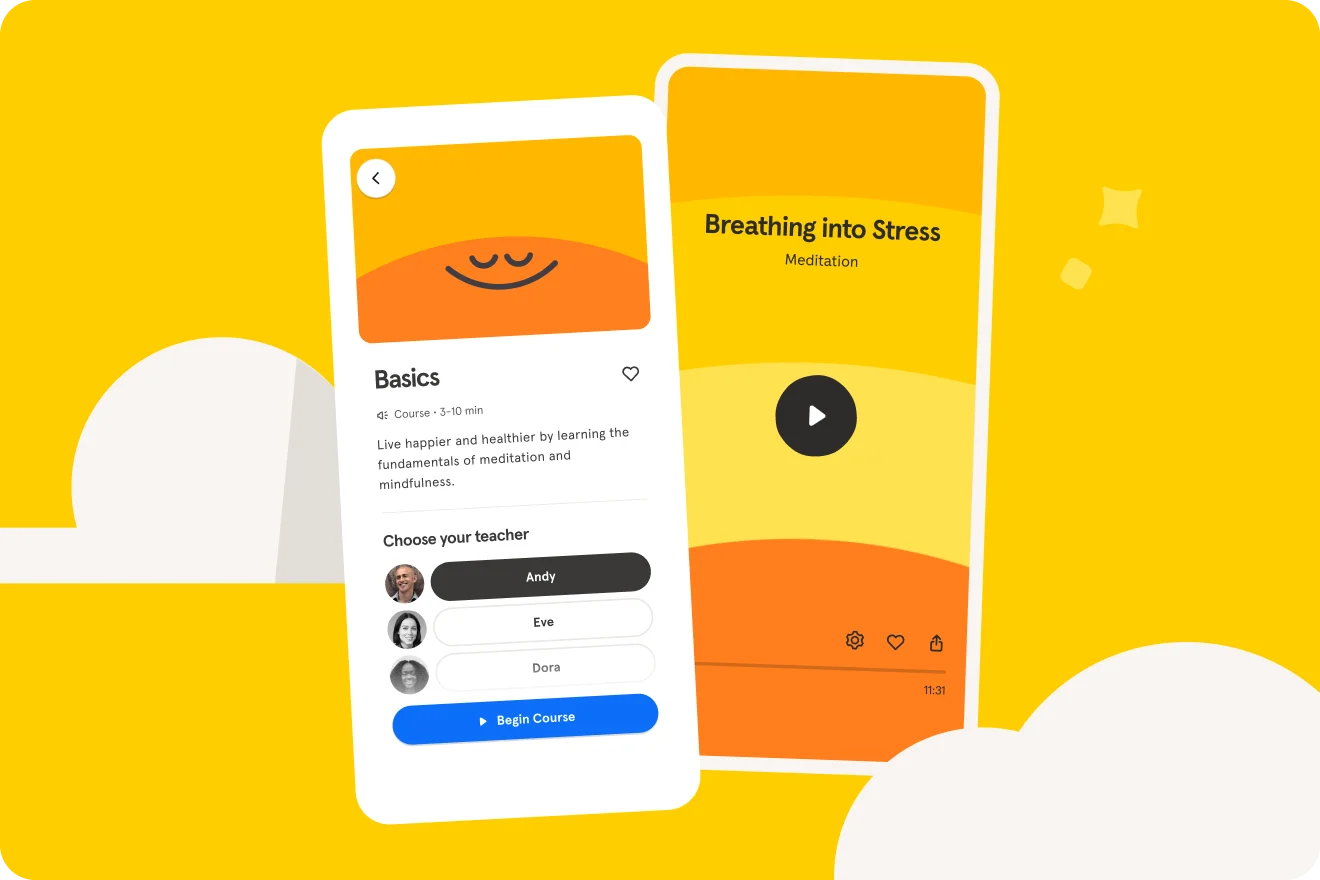Regulating Emotions
Sam explains the role of emotions in our lives, and how mindfulness can teach us better ways to react to difficult feelings.
Try 14 days freeBetter mental health starts with Headspace. Unrivaled expertise to make life feel a little easier, using guided meditations, mindfulness tips, focus tools, sleep support, and dedicated programs.
Try 14 days free
(gas hissing) (button clicking) (ethereal music) Headspace Studio. (serene music) Hi, Sam here. Welcome to Radio Headspace and to Thursday. So one of the most common issues people seek mindfulness for is emotional regulation. Whether it's anger issues or self-doubt, having emotions get the best of us impacts our relationships, our work life, and our overall health and wellbeing. I was so fascinated with the world of emotions that I pursued a master's degree in emotion science. So I wanna highlight two ways that we tend to regulate our emotions, one is beneficial and one much less so. They're called reappraisal and suppression. You may already have experience with suppression. I think all of us suppress urges, impulses, and emotions at times when we think that expressing them may be inappropriate. This kind of restraint is often appropriate and perfectly healthy. So for example, if your coworker says something infuriating you may suppress your anger temporarily so that you don't flip the table and take time to figure out how you wanna handle this situation wisely to preserve your job. However, if we use suppression as our primary way of regulating our emotions it can have some serious consequences. Like if you shut down whenever you and your romantic partner have an argument, maybe you're standoffish or quiet instead of saying how you feel, this can lead to resentment and a rift in the relationship. So you can see the difference between a brief moment of suppression and using suppression as a primary coping strategy. So here are some research findings regarding those who use suppression as a primary mode of dealing with difficult emotions: suppressors have reported experiencing less positive emotion and more negative emotion, including symptoms of depression and feeling inauthentic. In controlled experiments, they're less liked by their social interaction partners and the blood pressure of their interaction partners increases during that interaction. (serene music continues) Now, let's consider reappraisers. First off, reappraisal occurs when we change how we interpret or appraise a situation. So for example, if someone cuts you off on the freeway, you may immediately assume they're an inconsiderate jerk, feeling angry, and if you haven't had lunch yet, maybe even enraged. But if you imagine an alternate cause like maybe there's an emergency and they're trying to get to the hospital as soon as possible, then you may may have a more empathic or at least less emotionally-charged response. Research has shown opposite patterns for suppressors when compared to reappraisers. They show decreased negative emotions and increased positive emotional experiences. Those who choose to reappraise show reduced physiological stress responses and fewer depressive symptoms. Reappraising has been shown to improve memory and is linked to closer relationships with friends. So let's just take a pause and consider where you feel you fit along this continuum. Are you more of a suppressor or appraiser? See if you can let go of judgment or self-criticism as you start to consider your tendencies. Wherever you are on...
Details
About your teachers
- More about Andy
A former Buddhist monk, Andy has guided people in meditation and mindfulness for 20 years. In his mission to make these practices accessible to all, he co-created the Headspace app in 2010.
- More about Eve
Eve is a mindfulness teacher, overseeing Headspace’s meditation curriculum. She is passionate about sharing meditation to help others feel less stressed and experience more compassion in their lives.
- More about Dora
As a meditation teacher, Dora encourages others to live, breathe, and be with the fullness of their experiences. She loves meditation’s power to create community and bring clarity to people’s minds.
- More about Kessonga
Kessonga has been an acupuncturists, therapist, and meditation teacher, working to bring mindfulness to the diverse populations of the world.
- More about Rosie
Rosie Acosta has studied yoga and mindfulness for more than 20 years and taught for over a decade. Rosie’s mission is to help others overcome adversity and experience radical love.

Your lifelong guide to better mental health
Stress, sleep, and all the challenging emotions — care for your mind with the everyday mental health app that's shown to make a difference.
Try 14 days free
Look after your mind
Proven guided meditations and programs to help you stress less, sleep more soundly, and better navigate life’s challenges

Science-backed
Studies show that using Headspace for 30 days can reduce stress, increase resilience, and improve overall well-being

Explore 1000+ expert-led exercises
Access our library of meditations, breathing exercises, and guidance videos for stress, sleep, focus, everyday anxiety , parenting, and more.
Member reviews
Hear from some of our members
Your app brings so much peace and tolerance to our home.
Rachel
UK
Changing my thoughts has allowed me to change my life.
Davide
London
The stress and loneliness courses … taught me how to comfort myself.
Alicia
Canada
Headspace provides me with … a connection to myself, and a disconnection from negative thoughts, feelings, and sensations.
Keri
UK
Related to 'Regulating'
- © 2024 Headspace Inc.
- Terms & conditions
- Privacy policy
- Consumer Health Data
- Your privacy choices
- CA Privacy Notice

